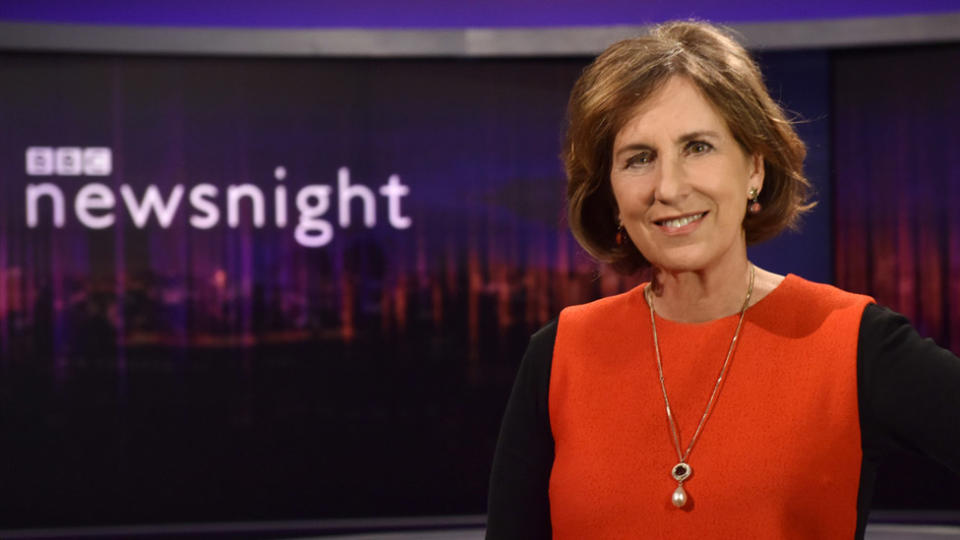BBC’s Newsnight to be cut back as part of savings plan
BBC Two’s Newsnight is to be cut back and have its format overhauled as part of a plan to save money in the corporation’s news department.
The long-running show will lose its dedicated reporters, be shortened by 10 minutes and drop its investigative films to focus on studio-based debates.
Meanwhile, the BBC News at One TV bulletin will be extended to an hour and will be broadcast from Salford.
The BBC also said it would put more money into digital journalism.
BBC News and Current Affairs CEO Deborah Turness said the broadcaster was “in a tough financial climate”, and had to make “some difficult choices” as audiences switch from TV to online news.
The National Union of Journalists (NUJ) said the Newsnight cuts represented “a major blow to investigative news”.
The moves are expected to save £7.5m. Overall, the corporation must find £500m in savings as a result of a two-year freeze to the price of a TV licence, which provides most of its funding, coupled with the impact of inflation.

Newsnight’s current 57-strong team will be cut by more than half to 23.
Turness said: “When we started work on this announcement, I did not know if it would make financial sense to keep Newsnight on air.
“We, like many other news organisations, have streamlined our editorial teams to avoid duplication. It simply no longer makes sense to keep a bespoke reporting team dedicated to a single news programme with a small and declining audience, however good that programme is.”
But she said the audience regarded Newsnight as “an important BBC brand”, and “what they most value is the discussion and debate at the end of each day”.
“So we’ve made the decision to reformat Newsnight as a 30 minute late-night news-making debate, discussion and interview programme,” she continued.
“The new programme will no longer have a dedicated reporting team, but it will have access to our top reporting talent and experts from across BBC News, who will take part in the conversation and share their expertise and insights.”
There will be an extra £5m for digital initiatives including more for “streaming, boosting online journalism around the clock, and making sure that the best of our in-depth, thought-provoking, and analytical journalism is much easier to find online”, Turness said.
Although the plans will save money, a net total of 20 jobs are expected to be created within BBC News overall.
“While TV and radio remain crucial to BBC News, we must invest in our digital platforms to ensure they are also the home of our very best journalism, and today’s package of measures will accelerate this transformation,” Turness said.
The plans also say:
-
A new investigations unit will “bring together the best investigative talent across BBC News”, comprising 39 journalists including new roles in financial and political investigations
-
BBC Verify will be expanded, with new roles including people with OSINT (open source intelligence) and policy analysis expertise
-
There will be a UK editor based in Salford, a royal editor, and new correspondents and reporters covering artificial intelligence, employment and housing
-
A new “in-depth digital experience” will be a destination for analysis and “thought-provoking” journalism from editors, specialists and experts
Responding to the announcement, NUJ broadcasting organiser Paul Siegert said: “While we welcome investment in digital, we have grave concerns that the axe is falling disproportionately on investigatory news output.”
He added: “The proposals would, on the face of it, diminish a part of the BBC’s output that has already been negatively impacted by previous rounds of cuts. The extension of BBC Breakfast and News at One would not provide an equivalent in-depth analytical and agenda-setting news product.”
Newsnight presenter Mark Urban wrote on X/Twitter: “I have worked on the programme for 32 years, around the world, risking my life many times for its journalism. You can well imagine my feelings at cuts to our staff and budget of more than 50%.”
‘A sad day’
Former Newsnight reporter John Sweeney wrote that the programme was “the trouble-making conscience of @BBCNews”.
He added: “For people who care about holding power and money to account, this is a sad day.”
Another former Newsnight correspondent, Dame Joan Bakewell, recalled “great days… but nothing lasts for ever!!”
The Media Podcast host Matt Deegan wrote that having “lots of dedicated people making packages for a show with less and less viewers due to changes in linear TV consumption made less and less sense”.
He said: “Its ‘brand’ is presenters giving politicians a hard time, which it will still do.”
Meanwhile, the News At One will be the first daily BBC national TV news bulletin to be broadcast from outside London, the corporation said.
It will join outlets including BBC Breakfast and Radio 5 Live at MediaCityUK in Salford.
Acting BBC chair Dame Elan Closs Stephens spoke at the Voice of the Listener and Viewer conference on Wednesday, saying the corporation needed “focus and a determination” as it seeks to make savings.
“This has meant – and continues to mean – difficult choices, with implications for our services and of course for our audiences,” she said.
“However, I believe that the challenge, the real challenge for me and the board, is how to make sure that a leaner BBC can also be a better BBC.”